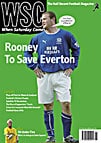 Red Devils fan Ashley Shaw considers the problems facing Manchester United, with the help of a recent book
Red Devils fan Ashley Shaw considers the problems facing Manchester United, with the help of a recent book
The decline of Manchester United has never been more apparent. The club’s hegemony is challenged on and off the pitch by richer rivals and would seem to have all but disappeared following the recent loss of key personnel at all levels. When one factors in the date with calamity suggested by the civil case brought by the manager against the largest shareholder and the continuing spat with the Football Association over Rio Ferdinand’s memory lapse, it seems harder not to reach for cliche and file United under “club in crisis”.
Granted, a few of the recent personnel losses have been of the club’s making. Yet perhaps one that wasn’t will prove most significant: the death of former plc chairman Sir Roland Smith. His calming voice on the board and in vociferous shareholders’ meetings was legendary while his aggressive marketing strategies made United a worldwide behemoth.
The losses of David Beckham, Juan Verón, chief executive Peter Kenyon and spokesman Paddy Harverson all point to a power on the wane, a sense that the big challenges no longer lie at Old Trafford. As if to add to the depression forming over Stretford, one of the first acts of new chief executive David Gill has been to fall out with the FA in spectacular fashion. Fans used to joke that the club should withdraw their players from the England team following the constant abuse suffered by Beckham and the Nevilles over the years. Yet now a ban for Ferdinand seems almost inevitable, as Sir Alex Ferguson’s relationship with Sven-Göran Eriksson descends into farce. Meanwhile, Gill’s response to the crisis appears devoid of the subtleties that make a good leader. United should have taken Rio’s punishment on the chin, instead of throwing their weight around.
The new chief exec enjoys a walk-on part in Ned Kelly’s autobiography, yet Gill comes across as a self-important dullard uneasy in the company of his manager, a state of affairs that doesn’t bode well for Fergie’s imminent contract negotiations. However, given Martin Edwards’ propensity to wander into the ladies’, Gill seems like a safe pair of hands.
In Manchester United – The Untold Story Kelly portrays a club packed with self-serving individuals enjoying or seeking the lifestyles of the rich and famous – a world away from the United of Matt Busby. The lasting memories are of Ferguson feathering his own nest while players receive complimentary blow-jobs in hotel toilets, suggesting perhaps a new football dream away from boring old trophies and medals.
And although the bacchanalian lifestyles described insult the standing of a great institution, the players and manager appear to take their lead from the top: United solicitor Maurice Watkins openly leads a double life with a wife and a bit on the side, the boardroom and directors’ offices are bugged first by an unknown interloper then by Edwards himself, while Ferguson contributes to the paranoia with a full security sweep of his home and office.
Paranoia is United’s affliction. The board, coaching staff and players think and act as if everyone is out to get them, a state of mind brought about by the unrelenting attention of the press, constant criticism and bad-mouthing by rival clubs, and an increasingly difficult set of challenges. Gill, Ferguson, Roy Keane and even the supporters share this bizarre mental state that asserts self-justification over right and wrong.
A hate figure for many, Ned Kelly nevertheless tells his story with a former squaddie’s sense of duty – yet ultimately his loyalty mattered not a jot. When he needed the help of to Ferguson, Edwards and co (following paper-thin newspaper allegations that he was a ticket tout) he received a short phone call suggesting his presence was no longer required. And perhaps this is the reason for the club’s continuing success – for when push comes to shove United remain the ultimate self-preservation society, as eager to do each other out of a quid as they are their rivals out of the title.
From WSC 203 January 2004. What was happening this month